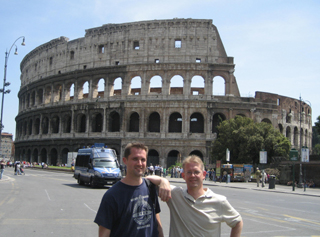 Sunday, May 10, 2009 was Mother’s Day and my cousin Chris and I celebrated the holiday by taking the Mother of all walking tours through one of the most famous cities in the world: Roma. For those not in the know, that is the correct name of the city that we Westerners refer to as Rome. After you read this account of this exhausting day, you will understand why I ended it with blisters on my feet – and enough material to create the longest Catsafterme posting ever.
Sunday, May 10, 2009 was Mother’s Day and my cousin Chris and I celebrated the holiday by taking the Mother of all walking tours through one of the most famous cities in the world: Roma. For those not in the know, that is the correct name of the city that we Westerners refer to as Rome. After you read this account of this exhausting day, you will understand why I ended it with blisters on my feet – and enough material to create the longest Catsafterme posting ever.
Chris and I got up before 6am to ready ourselves for our venture. Although it was only midnight at home, I had already accustomed myself fairly well to the time change and was raring to go. We stuffed everthing we needed (including long pants to wear in St. Peters in Vatican City) into one backpack, which Chris carried all day long. By 7am, we were out the door of his apartment in Florence and were hiking to the train station. Since we were walking through the city so early, we did stop by the Piazza della Signoria to get some photos of me with some of the more famous works of art located there while most of the tourists were still sleeping. I will save these photos to post with my future Florence postings however (seen here).
By 7:30 we had arrived at the train station and had purchased our tickets to Rome. I declined breakfast at Chris’ place so that I might enjoy a nice Lilliput sandwich at the Chef Express Bar in the train station. Nothing like prosciutto for breakfast. Our train left at 7:50 and arrived in Rome at 9:30. The ride was mostly uneventful besides enjoying our breakfast, gawking at the hot girl who never smiled sitting next to Chris, and Chris’ incredibly squeaky table.
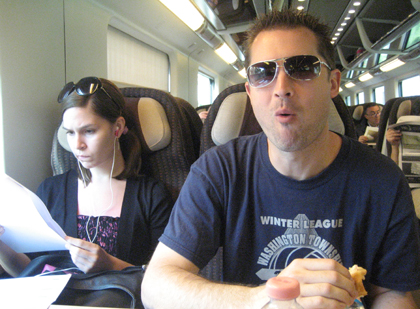
Chris with the girl who didn’t smile or say a word. But she was reading a book in English. Go figure.
Once we arrived in Rome, we wasted no time in beginning our hike which literally took us from one end of Rome to the other. Our first stop of the morning was a brief one – at Basilica Papale di Santa Maria Maggiore (Papal Basilica of Saint Mary Major). A basilica is basically a church or religious gathering place. This was certainly a beautiful church, which dated back to to the year 440. Since this was Sunday, there was actually a service in session and it was nice to see one of these ancient churches in action.
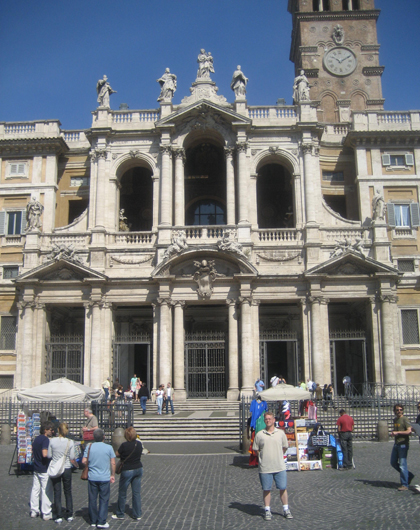
Outside the Basilica Papale di Santa Maria Maggiore
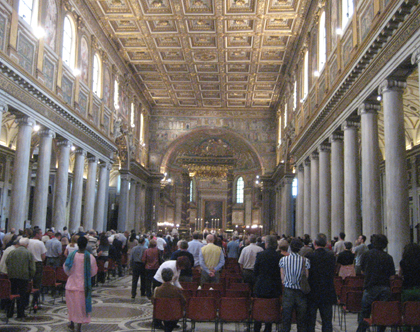
In service
Our next stop was at San Pietro in Vincoli (St. Peter in Chains). Rather unassuming from the outside, St. Peter’s is best known for housing Michelangelo’s famous statue of Moses, sculpted in 1515. Although the sculpture depicts Moses with horns on his head, it was fashioned this way because of an erroneous translation of ‘rays of radiating light’. The basilica itself was build circa 440 to house the relic chains that had been worn by St. Peter when he was imprisoned in Jerusalem.
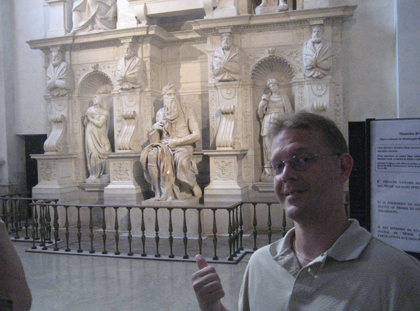
With Michelangelo’s famous Moses statue
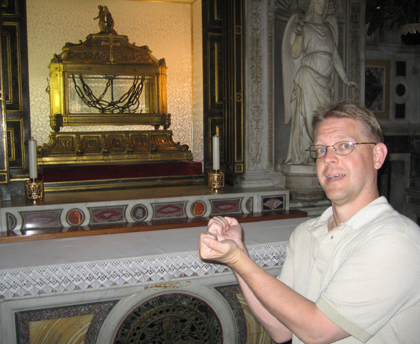
Emulating the plight of St. Peter
At around 10:30 that morning, the world-famous Colosseum made its first appearance. I can distinctly remembering as we passed beyond a building that was obscuring the Colosseum from sight that at one second I had never in my life seen the famous Roman Colosseum – and a second later I had! The thrill of seeing this iconic structure from the outside even outweighed my interest of seeing it on the inside. Nevertheless, Chris and I lined up to go inside. Although we were promised by eager tour guides that the lines would take hours, it only took about 30 minutes to get inside. The cost to get in was eleven Euros and included entrance to the Forum as well.
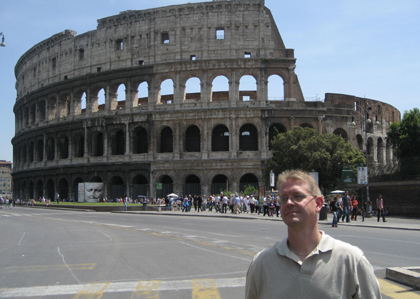
Yep, that’s it!
Originally named the Flavian Amphitheatre, its construction began about 70 A.D. as a gathering area for up to 50,000 spectators to view gladiator events and public events. It has been estimated that a half-million people were killed during the various contests along with a million animals. The structural damage of the Colosseum was caused by both earthquakes and looters. It was fascinating to be inside this structure and view the underground area where prisoners and animals were kept. We strolled the area for just over a half-hour.
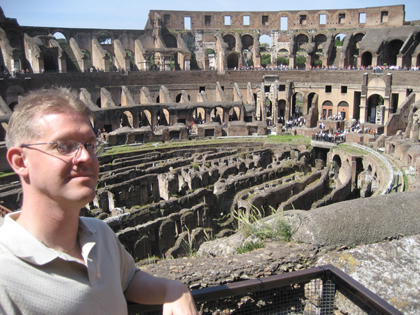
The inside of the Colosseum. The middle portion are the rooms and hallways under the arena floor, which obviously is no longer there
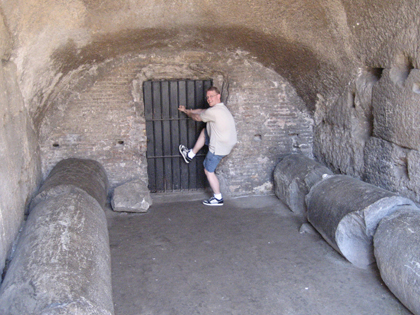
In search of the lions den inside the Colosseum
While we were in the Colosseum, I did something stupid and either lost or discarded my ticket which would get me into the Forum. Chris being the nice cousin that he is let me use his ticket to take a stroll through the Forum since he had seen it before. It would have been more ideal to be able to have Chris there to explain what we were seeing, as he so capably did throughout the entire tour of Rome.
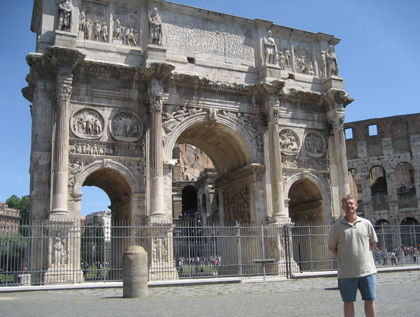
The triumphal Arch of Constantine outside the Colosseum (seen in the background at right) was dedicated in 315 A.D.
Before I entered the forum, we took a walk over to the area known as Circus Maximus. This site is now merely a valley and public park, but at one time had been utilized for public games and chariot races. For some reason, there were costumed gentlemen hanging around and looking like gladiators.
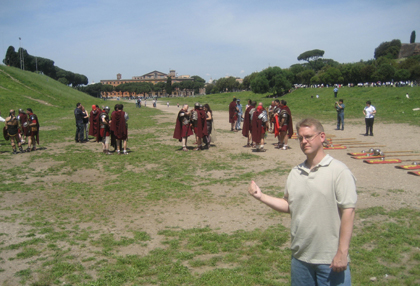
In the valley of Circus Maximus with a scad of gladiators
The Roman Forum dates back to 600 B.C. It is not known when the Forum first began its decline, but by 700 A.D., the area was already in ruins and soon buried. Archaeological digs began as early as the late 1700’s. It was very interesting to see these ruins in their present state amidst the hustle and bustle of modern day Rome. I browsed it quickly in about 30 minutes and then met Chris waiting outside the Forum. The exit had been closed off where I was supposed to meet him, so I exited in another section and walked the distance around the Forum to find him, envisioning my fate if I were to become lost on my own in Rome.
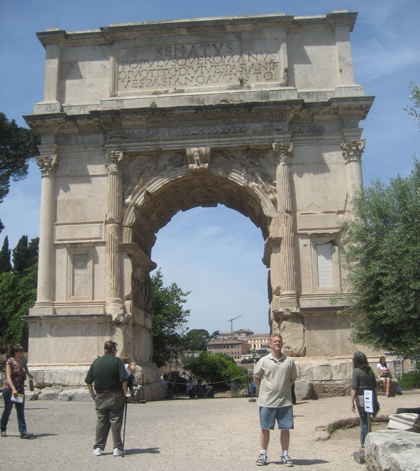
With the Arch of Titus inside the Roman Forum
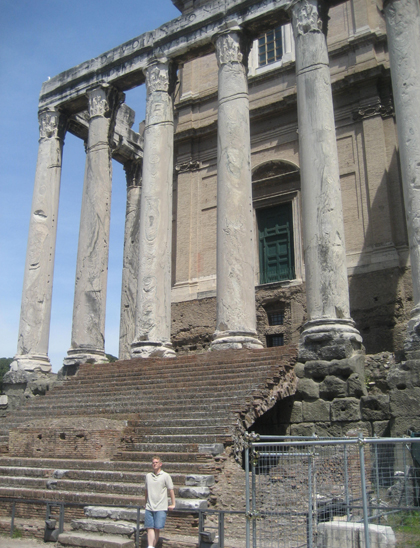
The Temple of Antoninus and Faustina. Construction began in 141, quite a while before I was born
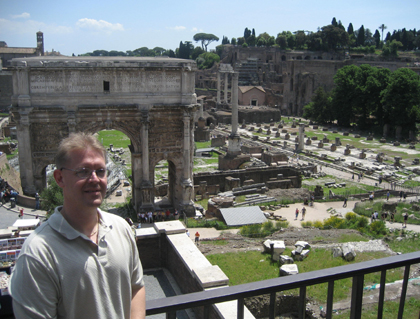
Overlooking the Forum, with the large Arch of Septimius Severus in the foreground
From the Forum, we headed over to the Capitoline Museums, which are a group of art and archaeological museums surrounding the Piazza del Campidoglio, designed by Michelangelo. We did not go inside but rather I posed for a few photos with a couple statues outside the museum.
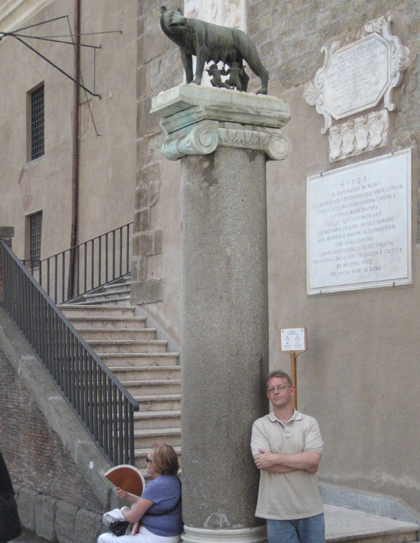
An icon of Rome. Not me…the statue of the Capitoline Wolf. It depicts Remus and Romulus suckling at the teat of the She-Wolf and has stood in this spot since 1473.
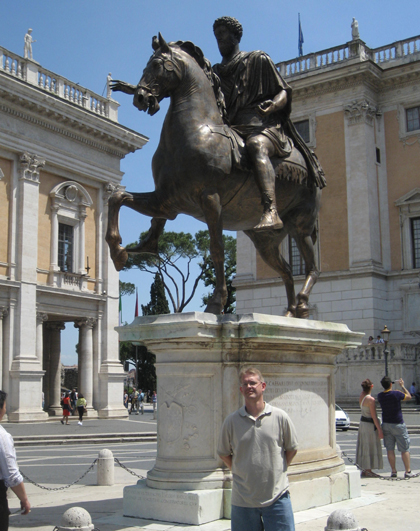
Replica of the Equestrian Statue of Marcus Aurelius, which sits on Capitoline Hill in the Piazza del Campidoglio. The original from 176 A.D. is inside one of the Capitoline Museums. This one was created in 1981.
We ended the early afternoon portion of our ventures by swinging by first the Monumento Nazionale a Vittorio Emanuele II (National Monument of Victor Emmanuel II), the first king of the unified Italy from 1861-1878. The monument was completed in 1935 ~ and then finally Trajan’s Column, a monument erected in 113 in honor of the Roman Emperor Trajan.
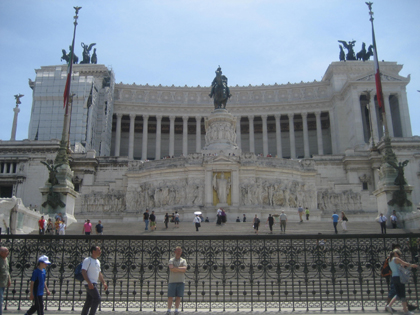
In front of the mammoth Monumento Nazionale a Vittorio Emanuele II
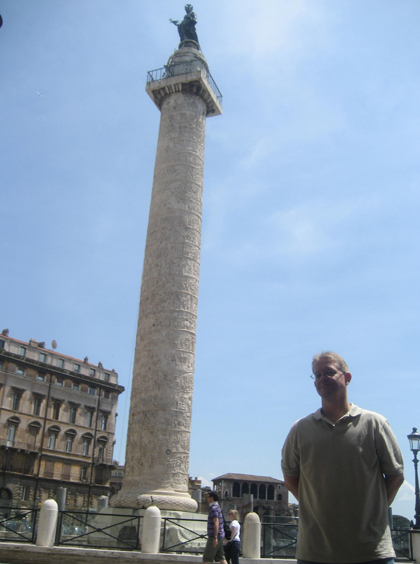
Trajan’s Column
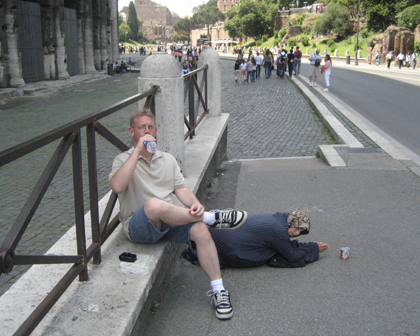
Many beggars throughout Italy just laid on the ground and expected money. Sing, dance, juggle, do something to earn it! Even still, I sometimes gave them a coin or two.
It was after 1pm at this point, so we headed back to through the Colosseum area (posing for a few more photos) and on to our hotel for the evening the San Jouan B & B. I was a bit nervous when we walked inside, seeing only rooms with one bed, no bathrooms, and no air conditioning (in fact Chris and I were both sweating like pigs in the hotel office as we checked in) – but we soon found rather nice accommodations, two beds, a very large bathroom, and most importantly, air conditioning. I scooped up a pocketful of hard candy from the comlimentary candy boat.
After checking in, we headed back out, stopping for a quick lunch at the Roma Lazio Snack Bar, where I was introduced to Spaghetti Carbonara. This little delicacy was simply spaghetti served with cheese, eggs, and bacon (or ham). I really liked it but Chris said he had had better. Our waitress was a real hoot too as she came out and unceremoniously dropped our plates onto the table. Such is the service in Italy.
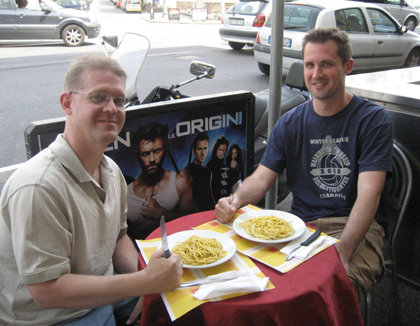
With the newfound spaghetti carbonara
In order to alleviate too much unnecessary walking, we caught a train from our area in southeast Rome to the Repubblica area in east-central Rome. Our first post-lunch stop was at the Santa Maria degli Angeli e dei Martiri (Basilica of St. Mary of the Angels and the Martyrs). This was a beautiful gigantic church which featured a very interesting sundial-type device called a meridian, which when coupled with the sun shining in through a designated hole in the wall, would somehow show the length of the year. Search me.
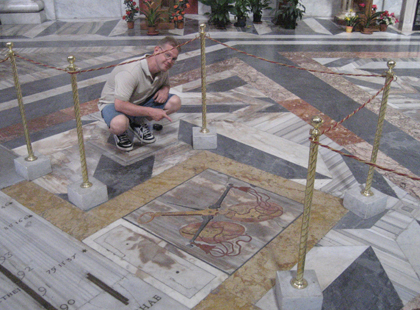
With the Libra artwork on the Meridian (seen in the lower left)
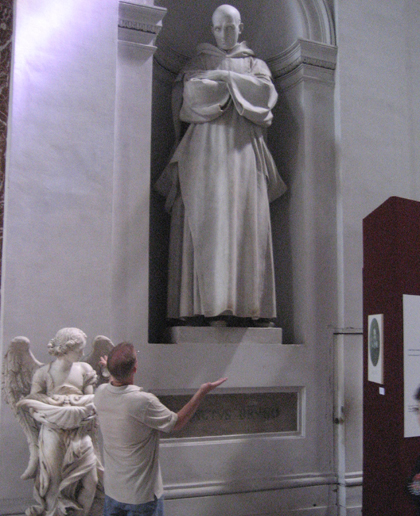
A disapproving Monk in the Santa Maria degli Angeli e dei Martiri didn’t care for that photo with the beggar
We crossed through the Piazza della Repubblica, past Chiesa di San Carlo alle Quattro Fontane (Church of Saint Charles at the Four Fountains), and Bernini’s Fontana del Tritone (Triton Fountain), before coming to one of the most disturbing things I’ve ever seen: the Santa Maria della Concezione dei Cappuccini (Our Lady of the Conception of the Capuchins).
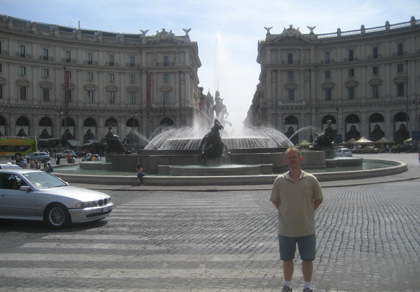
The Piazza della Repubblica
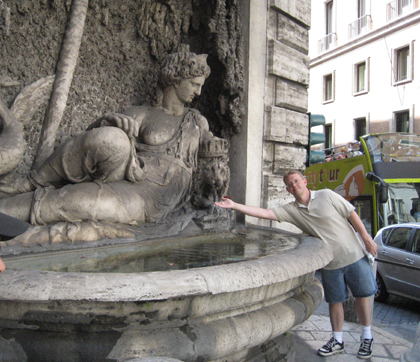
One of the four St. Charles fountains
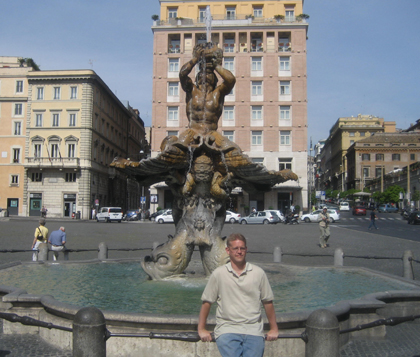
Bernini’s Triton Fountain
Inside this bizarre church is a crypt in which the bones of over 4000 Capuchin friars are decoratively displayed in hideous formation. I never realized that pelvic bones could be such a powerful art medium. Particularly ghoulish are skeletons dressed in monk garb, bowing to some bony sculpture or other. Picture taking was expressly forbidden, but after I saw a nun – yes, a nun – blatantly snapping photos, I decided to take just one myself. It’s rather blurry, but you get the picture. Creeps!
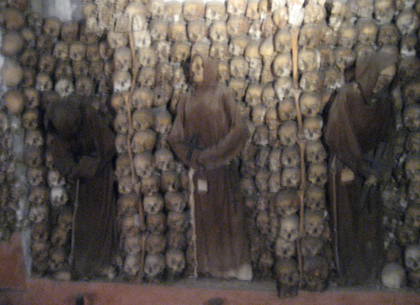
Bones…starved of flesh…
It was just after 4pm when we made our way to the famous Spanish Steps, which is not only the longest and widest staircase in all of Europe, but probably made most famous by their appearance in the Gregory Peck and Audrey Hepburn classic Roman Holiday. Naturally the tourists had flocked to this location, so it was difficult to actually walk down them without stepping on people. I didn’t mind.
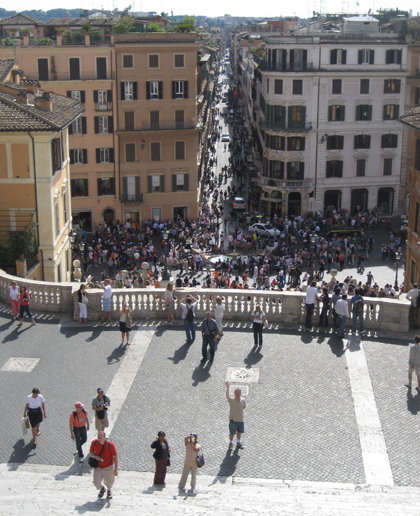
Looking up from the top tier of the Spanish steps
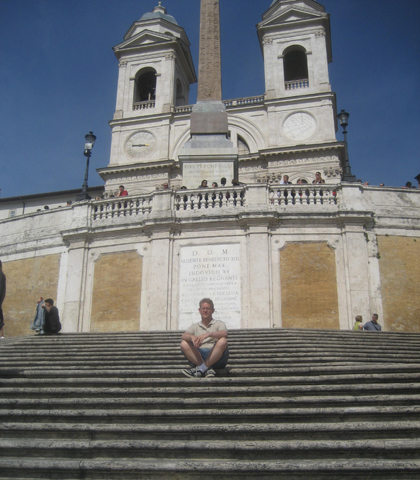
Relaxing on the Spanish Steps with the Trinità dei Monti church dominating in the background
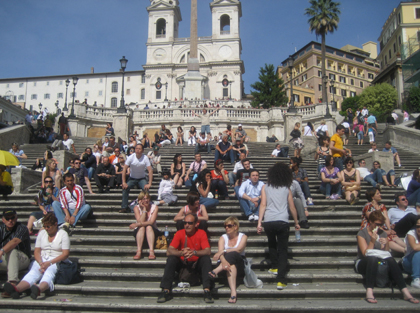
Where’s Brado? Find me among the tourists
Since we were in the area, we stopped by Via Margutta 51, the residence of Joe Bradley (Peck) from Roman Holiday. Although no footage was filmed of the exterior, which was now under construction (like apparently much of Italy), scenes were filmed inside the courtyard.
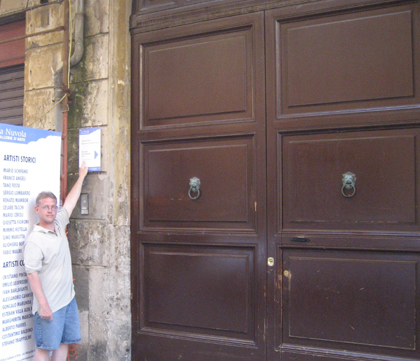
Outside Via Margutta 51
For our final ‘historic’ stop of the day, we walked over to the Piazza del Popolo (literally Piazza of the People, where Piazza is a city square, roughly the equivalent of a ‘plaza’). This is certainly one of the largest piazzas in Rome and was once the northern visitor’s first view of Rome upon arrival. It was also the location of many an execution. The was some hullabaloo going on there, which may or may not have been a police auction of some sort, so it was difficult to get any aesthetically pleasing views of the area.
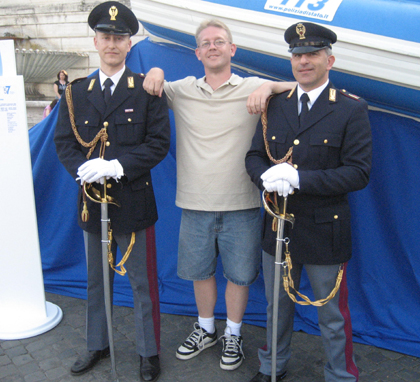
With a couple of flatfoots who had invaded the Piazza del Popolo
Still we climbed Pincian Hill, which borders the Piazza del Popolo on the east side. From here we could get a good view of the city, although the Piazza itself was blemished from all of the police decor. While atop the hill, Chris and I heard live Pink Floyd music coming from a park. The Roger Waters vocalist had an uncanny likeness to the real Waters, so we made sure to take a closer look lest we walk right by some bizarre impromptu Pink Floyd reunion. They were good…but they weren’t Pink Floyd.
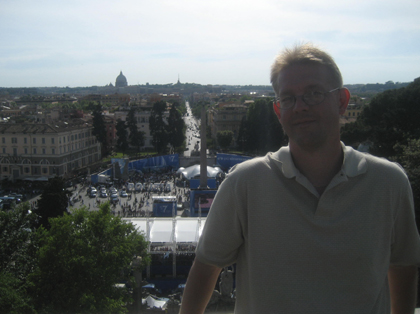
Overlooking the Piazza del Popolo from atop Pincian Hill
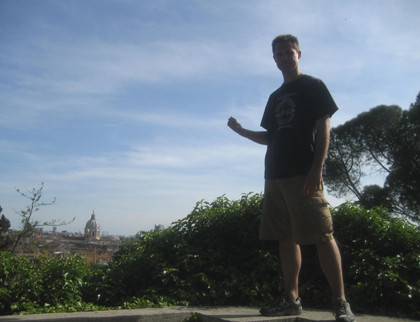
Chris climbs up on the safety wall on Pincian Hill. I’m telling Sarah!
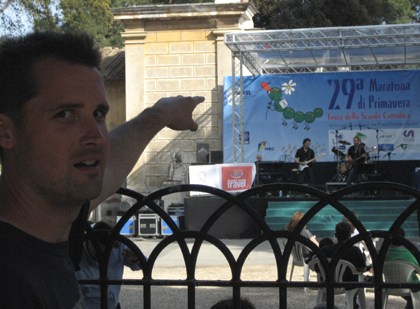
Chris and the psuedo-Pink Floyd band
After we descended the hill, we visited the Santa Maria del Popolo, a church located in the northeast corner of the piazza. This lovely church was built in 1099 and reconstructed around 1477. It contains many important pieces of art including two of Caravaggio’s most famous works Crucifixion of St. Peter and Conversion on the Way to Damascus.
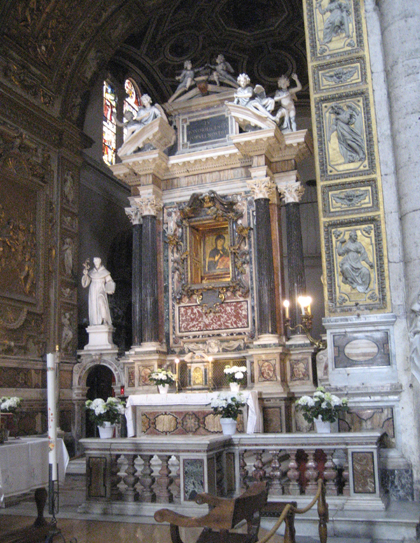
The altar in Santa Maria del Popolo
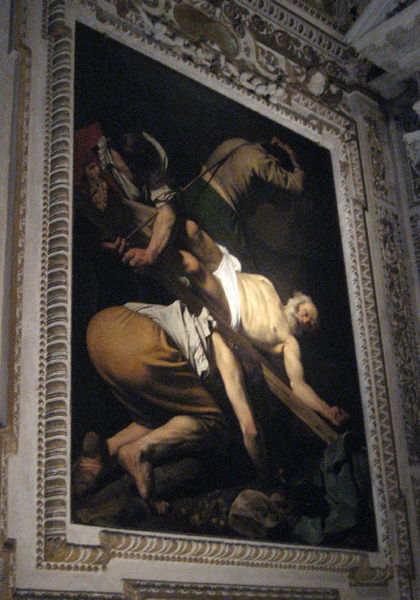
Caravaggio’s Crucifixion of St. Peter. Peter did not wish to be martyred the same way as Christ, so he was hung on the cross upside down
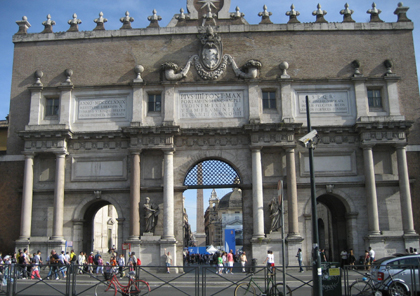
The Porta del Popolo, reconstructed by Pope Alexander VII in 1655 and designed by Bernini, to welcome the visiting Queen of Sweden
It was getting close to 6pm by this time and it was time to ditch the historical portion of the Sunday tour and head over to a more modern location to enjoy a visit to the Rome Hard Rock Cafe to fulfill my Hard Rock scavenger hunt that presently includes a photo outside the Hard Rock, eating inside, a photo while eating, a photo indicating the city in some fashion, and a photo with some piece of Big 7 memorabilia. If all of that is convenient, that is. On this particular visit, I enjoyed the delicious caramelized onion and swiss burger.
The Roman Hard Rock Cafe
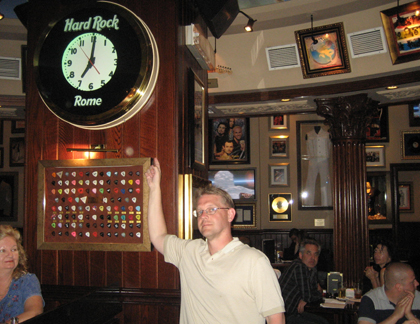
Hard Rock clock indicating Rome
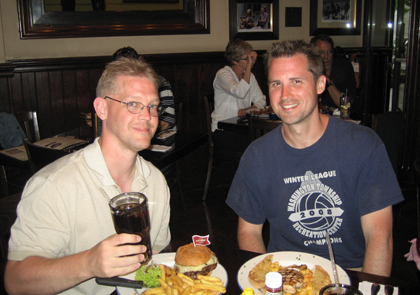
Two days into the trip and already back to Amercian food
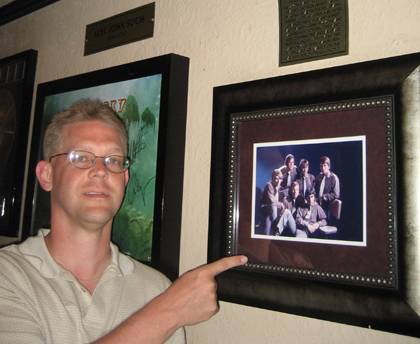
This was an interesting photo I had never seen of KISS’ Peter Criss’ former late-60’s NYC band Sounds of Soul. He’s the guy on the bottom. I had just met Peter Criss three weeks earlier.
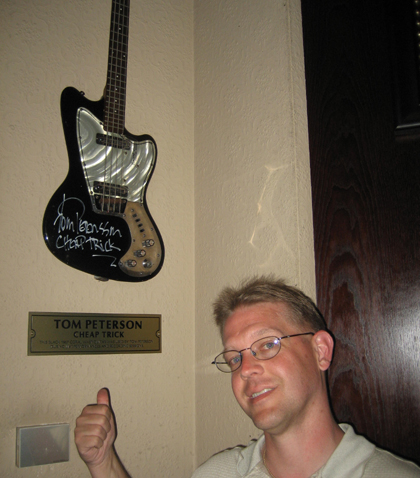
Cheap Trick guitar signed by Tom Petersson (name spelled incorrectly on the plaque)
By the time we arrived here, my feet were so tired and blistered that it felt wonderful to sit there for nearly two hours. After we finished eating and giving the place (which was surprisingly small) the once-over, I felt oddly rejuvenated and ready to walk again. So walk we did…to the nearest pub, the George Byron Cafe. Chris stuck with Guiness and I went with the San Lorenzo Chianti. When in Rome…
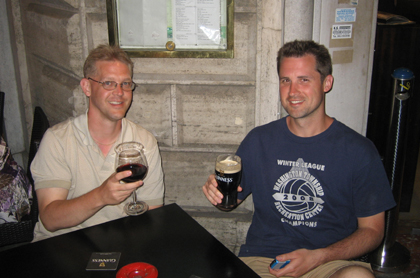
Drinks at George Byron
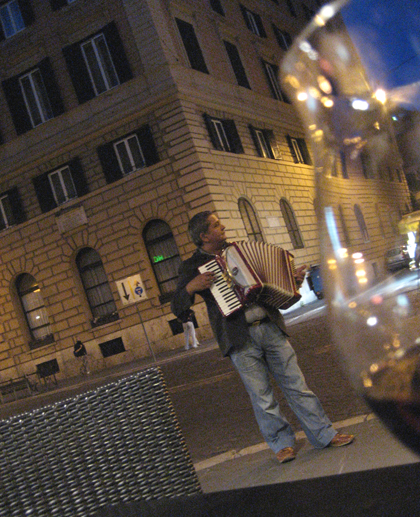
My artistic photo of the day – of an accordian player sereneding us at the pub. Sarah was unimpressed by my craft…
We took a nice Roman evening stroll back to the Repubblica to catch our return train at about 9:50, then walked from our destination train station to our B&B, arriving at 10:15. I don’t think either of us had much trouble falling asleep that night. Quite it day, it was.
Obviously, it would be another busy day in Rome and Vatican City coming up. And it would be my turn to carry the backpack.
Rome will continue…
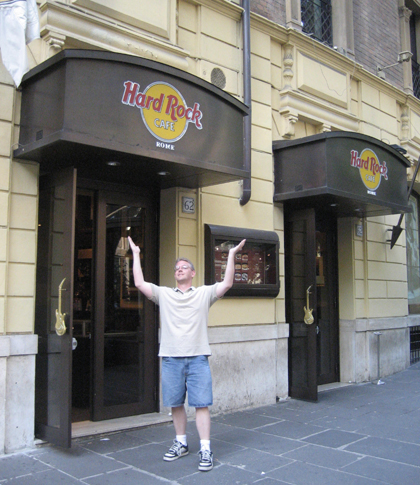
Nice posting, Brad. But that last picture sucks. 🙂
Sarah
May 31st, 2009
The look on your face while “Emulating the plight of St. Peter” surely makes it one of the most (if not THE most) priceless pictures on your site. Ever.
Peter
May 31st, 2009
You certainly achieved alot in one day. The pictures were awesome, of course my favorite was “Where’s Brado”. I’m glad you had such a great trip and who wouldn’t want to hang around with Chris all day.
Bev
May 31st, 2009
But did you actually find Brad in the picture?
Chris
June 1st, 2009
The girl on the train was reading English, but she only spoke Swahili.
I added it up on gmaps pedometer, and I believe we walked about 14 miles that day.
Chris
June 1st, 2009
Yes I did find Brad in the picture!
14 miles – Oh my gosh – I’m happy that I can now walk around the block.
Bev
June 2nd, 2009
“Where’s Brado?”
I think I found Brado! He is the one sitting on the stairs…right?!
Dave Chasteen
June 3rd, 2009